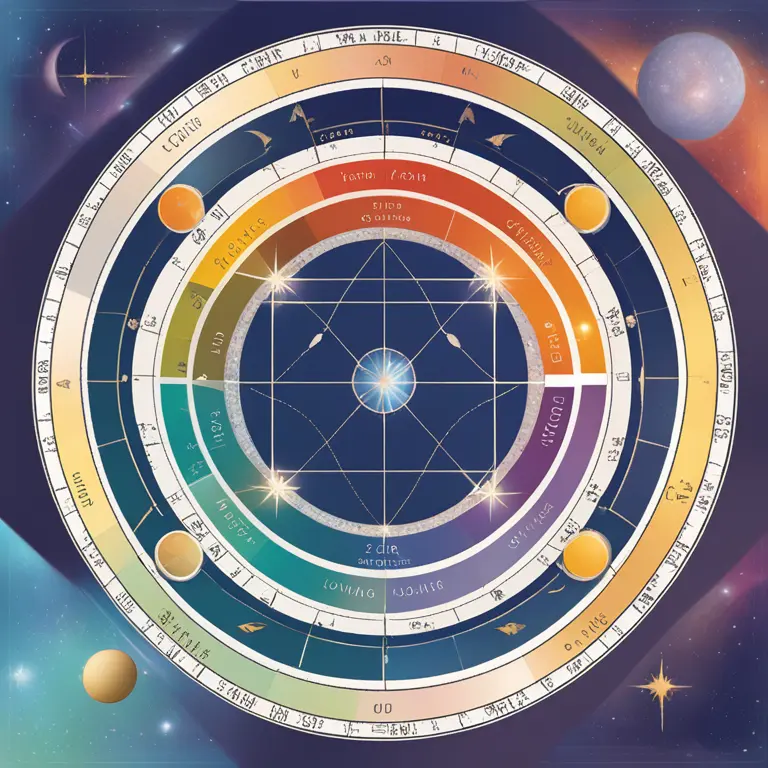
Locating Juno in Your Birth Chart: Significance and Meaning
Discover the position of Juno in your astrological birth chart and what it denotes for relationships, loyalty, and personal growth.
article by Priya Deshmukh
Introduction to Juno in Astrology
Juno is one of the asteroids used in astrology, and it holds special significance when it comes to relationships and long-term partnerships. Unlike Venus that represents love, beauty, and attraction, Juno digs deeper into the realm of unions, showcasing the dynamics of marriage and deep commitments. By finding Juno's place in your birth chart, you embark on a journey of understanding your needs in partnership and the qualities you seek in a life mate. While Juno’s sign provides insights into these aspects, its house placement reveals where these themes will play out in your life.

Significance of Juno Through the Zodiac Signs
As Juno traverses through the zodiac, it imparts distinct flavors onto your relational style. A Juno in Aries highlights a need for independence and excitement, while in Taurus it seeks stability and sensory connection. Gemini's communicative prowess characterizes a Juno placement here, as Libra's Juno seeks harmony and balance. In the emotional waters of Cancer, Juno values nurturing, whereas it becomes expansive and adventurous in Sagittarius. The placement of Juno in your chart is a beacon to the ways you approach commitment and what constitutes a soulful equal for you.

Juno Through the Houses
The house system in astrology acts as a stage for where the energies of the planets and asteroids play out. Juno in the first house points to self-awareness in relationships, while the seventh house highlights partnership itself. If Juno is found in the tenth house, one's career or public image may be closely tied to their significant relationships. Locating Juno in your own chart requires creating a natal chart with your exact birth time, which is pivotal in accurate house calculations. This endeavor provides valuable insight into the area of life where your deepest partnership lessons emerge.

The Aspects to Juno
When interpreting Juno in a birth chart, astrologers also examine aspects, or angles, it makes with other planets. These aspects can modify or emphasize Juno's influence in the birth chart. For instance, a conjunction with Venus might intensify the search for harmony in relationships, while a square to Mars could indicate a struggle for balance between independence and togetherness. These celestial dialogues paint a clearer picture of your relational blueprint and guide you in understanding how to navigate your path to a fulfilling partnership.

Mythological Roots of Juno
The etymology of Juno finds its roots in Roman mythology, where Juno was the goddess of marriage and childbirth, akin to the Greek Hera. She symbolized the ideal wife and guardian of the state. In astrology, Juno takes up similar nuances, emphasizing themes of loyalty, commitment, and sometimes the sacrifices made for the sake of a partnership. The stories of Juno and her husband, Jupiter/Zeus, though fraught with complexities, underline the depth of union that Juno in a birth chart can signify.
Modern Interpretations and Beyond
Today, the interpretation of Juno goes beyond traditional marital concepts. As society's understanding of relationship dynamics evolves, Juno's significance becomes more inclusive, encompassing all forms of deep commitments, whether personal or professional. The asteroid invites a broader reflection on what commitment means to the individual. Acknowledging this modern perspective, finding Juno's location in your birth chart signals where and how you seek enduring bonds and mutual empowerment in various facets of life.
Published: 1/22/2024
Modified: 1/22/2024
More predictions
Come back here soon to learn more about yourself and your future


The Essence Of Moon Phases
Delve into the essence of lunar phases, how they affect us, and their significance in astrology with a clear and concise guide to the moon's journey.


Moon Phases & Their Astrological Meaning
Discover the mystical meanings behind the moon's phases and how they influence astrology and personal growth.


How Moon Phases Influence Astrology?
Delve into how the moon's phases and its position influence astrology, horoscopes, and personal biorhythms.